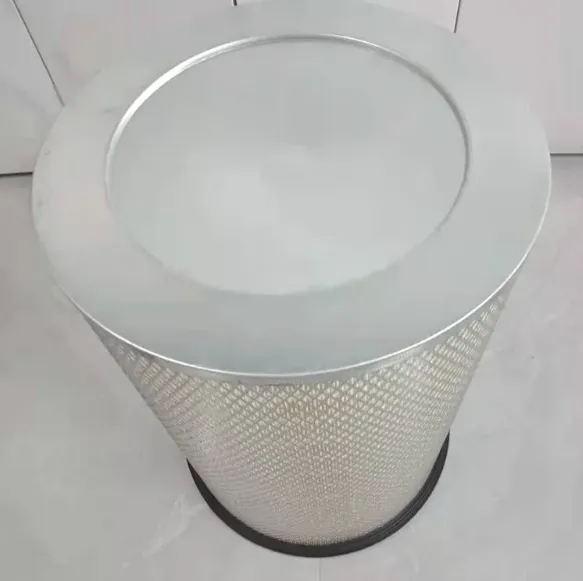 Tél :
+8615930870079
Tél :
+8615930870079
Nov . 22, 2024 11:34 Retour à la liste
High-Quality Filter Cartridges
In today’s industrial and residential environments, maintaining clean air and efficient machinery is paramount. High-quality filter cartridges, including air filter cartridges, HEPA filter cartridges, cartridge oil filters, and dust collector pleated filters, play crucial roles in ensuring optimal performance and air quality. This guide will explore the importance of these filters and provide insights into choosing the right products for your needs.

The Importance of Air Filter Cartridges
Air filter cartridges are essential components in various air filtration systems. They help trap airborne particles, allergens, and contaminants, significantly improving indoor air quality. From residential HVAC systems to industrial air purifiers, air filter cartridges are designed to meet different filtration needs.
Choisir le bon air filter cartridge is vital for ensuring that your system operates efficiently. Factors to consider include the size of the filter, the type of contaminants it can capture, and its lifespan. High-efficiency filters are designed to trap even the smallest particles, providing cleaner air and reducing the risk of respiratory issues. Regularly replacing your air filter cartridge is also crucial for maintaining airflow and system performance.
Exploring HEPA Filter Cartridges
HEPA filter cartridges are renowned for their exceptional filtration capabilities, capturing up to 99.97% of particles as small as 0.3 microns. This makes them ideal for environments that require strict air quality standards, such as hospitals, laboratories, and cleanrooms. The efficiency of HEPA filter cartridges ensures that harmful particles, including dust, pollen, and smoke, are effectively removed from the air.
Lors de la sélection d'un HEPA filter cartridge, it’s important to ensure that it meets industry standards, such as the HEPA classification. Additionally, understanding the airflow requirements and compatibility with your system will help maximize the filter's effectiveness. Investing in quality HEPA filter cartridges can lead to significant improvements in air quality and overall health for occupants.
The Role of Cartridge Oil Filters
Cartridge oil filters are essential for maintaining the health of engines in various vehicles and machinery. These filters remove contaminants from engine oil, ensuring that the oil remains clean and effective in lubricating moving parts. Neglecting to replace a cartridge oil filter can lead to engine wear and reduced performance, making regular maintenance critical.
When choosing a cartridge oil filter, consider factors such as compatibility with your engine, filter capacity, and filtration efficiency. High-quality oil filters are designed to capture particles and contaminants effectively, prolonging the life of the engine. Moreover, regular inspection and timely replacement of the cartridge oil filter can enhance engine performance and fuel efficiency.
Understanding Dust Collector Pleated Filters
Filtres plissés pour dépoussiéreurs are vital components in dust collection systems, commonly used in industrial settings. These filters feature a pleated design that increases the surface area for capturing dust and particulate matter, enhancing the system's efficiency. By using dust collector pleated filters, businesses can maintain cleaner working environments and comply with health and safety regulations.
Selecting the right dust collector pleated filter involves understanding the specific dust types your system will handle, as well as airflow requirements. High-quality pleated filters can trap fine particles, reducing the risk of respiratory issues among workers. Regular maintenance and replacement are crucial to ensure that your dust collection system operates at peak performance.
Maintaining Filter Efficiency
The effectiveness of your air filter cartridges, HEPA filter cartridges, cartridge oil filters, and dust collector pleated filters depends significantly on regular maintenance and timely replacements. Filters that become clogged or dirty can lead to reduced efficiency, increased energy consumption, and potential health hazards.
To maintain filter efficiency, it’s essential to establish a routine inspection schedule. Check filters regularly for signs of wear, damage, or clogging. Following the manufacturer’s recommendations for replacement intervals is also important. By investing in high-quality filters and adhering to a proper maintenance schedule, you can ensure optimal performance, enhance air quality, and prolong the lifespan of your systems.
-
Types and Applications of Air Filtration CartridgesNouvellesJul.28,2025
-
The Role of Gas Turbine FiltersNouvellesJul.28,2025
-
Mastering Air Filter Cartridge UseNouvellesJul.28,2025
-
Advanced Turbine Filters for Modern Gas TurbinesNouvellesJul.28,2025
-
Cellulose Air Filter Cartridge Advantages in Dust FiltrationNouvellesJul.28,2025
-
Cellulose Filters for Air Particle ReductionNouvellesJul.28,2025

 E-mail:
E-mail:





